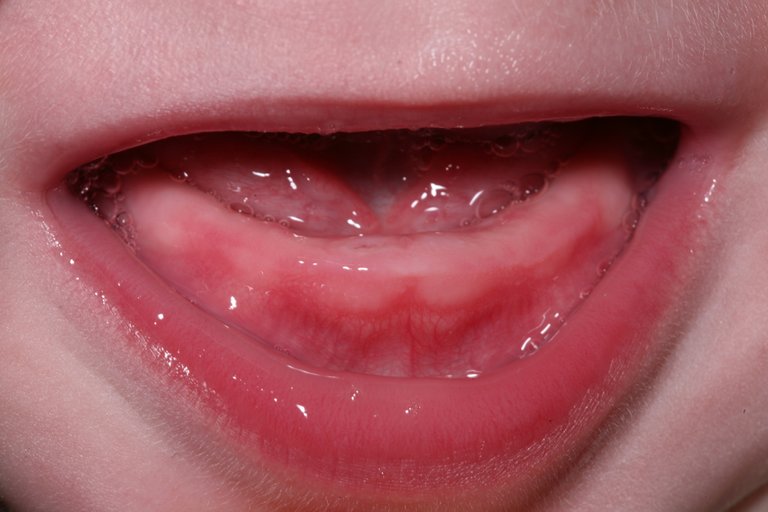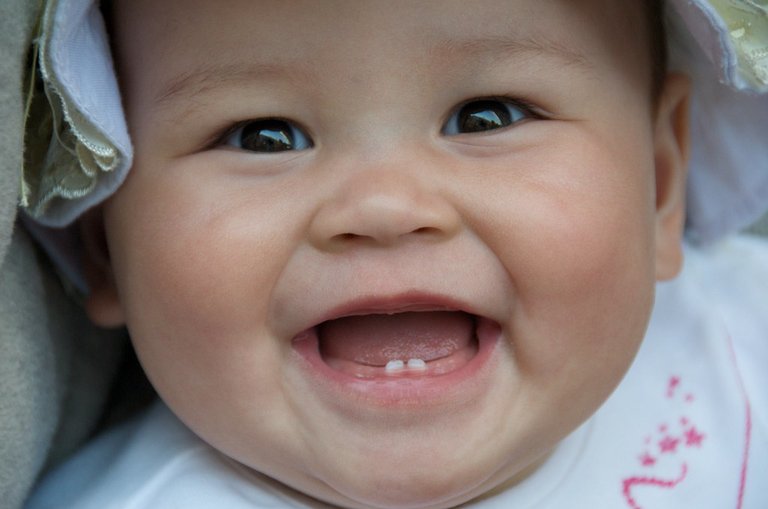I don't think there is a greater feeling than watching a child grow through different stages of life, it comes with a lot of mixed emotions, from happiness to feeling stressed, and then intense joy afterwards, it is just a lot. Lately, my baby has started to bite me whilst sucking, I was wondering if it was not too early for him to start doing that, so of course, I took to my research path to understand the entire process of teething and what really happens there.
Normally, teeth development begins in an unborn child, healthy nutrition from the mother during pregnancy is a strong tool for an healthy tooth development in a child. A mother's diet should contain sufficient amount of phosporus, calcium, Vitamins D and C.

source
Tooth development entirely comes in four stages, the first stage begins at 6 weeks of pregnancy in an unborn child, this is when the basic substance of the tooth forms. Afterwards, the hard tissue surrounding the teeth is formed around 3-4 months of gestation.
The next stage of tooth development is when the tooth begins to protude through the gum, and eventually, when the child begins to loose his primary or baby teeth.
Little wonder why I was adviced by a nurse whn I was pregnant to avoid some medications, she specifically mentioned tetracycline, she stated it was for the safety of my child's tooth, and at the time I was thinking how my unborn child who clearly has no teeth yet could get affected by a medicine. However, I found out during the course of my research that, a medication like that taken by a pregnant woman may cause teeth discoloration in the child.

source
The human teeth are of different types;
Incisors- The front teeth located in the upper or lower jaws, each incisor has a thin cutting edge, it is the upper and lower incisors that actually come together in form of scisors to cut the food.
Premolars- have flat surfaces, used to crush food.
Canines- are the pointy that appears on both of the incisors, in the upper and lower jaws, usedfor the tearing of food.
Molars are usually larger in size than premolars, they appear towards the back of the mouth, with a broad, flat surface used for grinding food.
What we call teething in children varies from one child to another, it is that time when tooth begins to break through the gum line. While some children will begin to grow their tooth when they are only a few month old, other children may need to wait until their child is 12 months old or more.
Regardless of the fact that, timing may not be the same for all children, the order of tooth development is more consistent. The lower incisor teeth erupts first, then upper incisors follows suit and thn the first dciduous molars. It takes a child to be at the age of 3 averagely when they have their 20 deciduous teeth.
At about 6 years old, your baby would begin to loose his or her primary set of teeth, and the first set to be lost are usually the central incisors followed by te first permanent molars coming in. Last baby tooth is usually lost at the age of 12, which i the cuspid or scond molar, and at the end of the day, there would be a total of 32 permanent teeth.
To ensure that your baby has a good set of teeth, it requires a lot of attention and diligence from parents/caregivers, thee tips would help out a lot;
The moment your baby's teeth begins to appear, start cleaning them even before they fully erupt. Use a soft, damp cloth or guaze to carefully clean teth and gum after feeding.
Do not give your child starchy or surgary food and drinks, it may lead to tooth decay, instead reach out for nutrient rich food like vegetables, fruits, and diary products.
Opt for consistent dental check-ups with your child's pediatric dentist, this will help fish out potential issues on time and help ensure your baby's teeth is developing appropriately.
Once your baby has several teeth, you could making use of a small, soft-bristled toothbrush to clean their teeth. A Small sized toothbrush and a flouride toothpaste is advisable.
As a parent, do not listen to the lie people say about baby tooth not been important since they will eventually fall out. The fact is that, a baby's tooth plays a significant role in the genral development of a child including speech, jaw growth, and eventual poitioning of permanent teeth. When baby teeth is lost too early, it could cause problems related to chewing,speaking, and even teeth allignment.
Teething comes with discomfort in a child, and parent must be ready to engage in activites that eill make their child feel better, calm, and safe at a time like this.
For Further Studies
https://www.betterhealth.vic.gov.au/health/conditionsandtreatments/teeth-development-in-children
https://www.ncbi.nlm.nih.gov/pmc/articles/PMC4538790/

Hi, I am Tobi, a writer, speaker, relationship blogger, and lover of good music. I love making friends and learning from people. If you want to hear me speak on relationships and general life issues, you can find my YouTube channel where you can watch any episode for free, please do not forget to subscribe, friends. I sincerely appreciate every love I get from here, Kindly do well to keep them coming.
